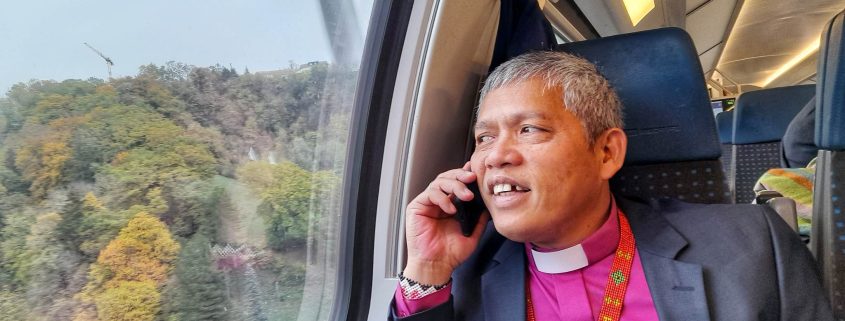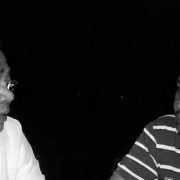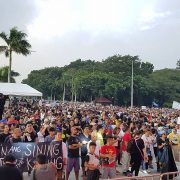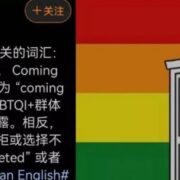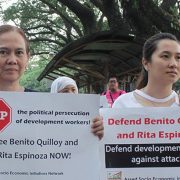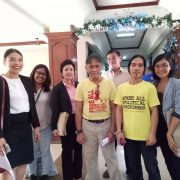‘FOR MY CHURCH AND MY PEOPLE’: Filipino Bishop bears cross in foreign lands
By Raymund B. Villanueva
Nearly 650 bishops of the global Anglican Communion gathered at England’s Kent University last July 27 to August 8 for its Lambeth Conference that only happens once every 10 years. In one of his daily addresses to their most important gathering of leaders, Archbishop of Canterbury Justine Welby asked the nine Philippine Episcopal and Iglesia Filipina Independiente (IFI) bishops in attendance to stand after a moving choral rendition of the Filipino song “Dulang ng Ama.”
Welby prayed: “Our Lord and Gracious God, unite Your church in the Philippines and give them strength with their new government. Bring their bishop in exile who has not seen his family for two years and may not see them for another four or five. Bring him back from exile. Transform government that it may be made in justice, may be able to hear criticism and change habits. Bless the Philippines with peace in places of war and struggle. Bring reconciliation. We pray, in Jesus’ name. Amen.”
Church of England’s supreme bishop Welby implored for IFI Bishop Chaplain in Europe Antonio Narcua Ablon, one of the most persecuted church leaders in the world today.
Red-tagged
Bishop Ablon’s persecution began in June 2018 when he joined a human rights fact-finding mission in Barangay Saad in Dumingag, Zamboanga del Sur in June 2018. They received word that a Philippine Army unit has encamped in the indigenous Subanen community that resulted in harassments, intimidation and the arrest of two residents. On the mission’s second day, the soldiers told the bishop and his team to leave as “they did not coordinate with the military.” After returning to his diocese, a Col. Merlowe Patria paid Bishop Ablon a “friendly visit” to order him to seek permission from him and the mayor next time, “so as not to disrupt special projects in the area.” The military officer also warned the church leader not to publicize the information they gathered.
Barangay Saad suffered more harassments after the fact-finding mission. The soldiers went house to house soon after and organized a “mass surrender ceremony” of alleged New People’s Army (NPA) sympathizers in August of that year. Unable to abandon his flock, Bishop Ablon facilitated another fact-finding mission, this time by the Commission on Human Rights and the International Committee of the Red Cross.
The retribution against the bishop started a month later. In September, their churches were defiled and painted with “IFI = NPA!” Throughout northern and western Mindanao, streamers and traffic barriers screamed allegations of the bishop’s connection with the underground revolutionary army, along with other groups such as the Rural Missionaries of the Philippines, Bayan Muna, Bagong Alyansang Makabayan, the United Church of Christ in the Philippines and others.

In response to increasing threats to his life, the Lutheran Church of Northern Germany and the Christian Catholic Church (also known as the Old Catholic Church, OCC) in Europe invited Bishop Ablon to a conference in Germany in May 2019. Before he could return to the Philippines, however, police officers barged into his Pagadian cathedral, looking for him. The armed men confronted his deacon and told him the bishop is being served with an arrest warrant. When the priest demanded to see the document, he was told it was merely a joke.
The OCC Bishop of Utrecht, the church’s traditional leader, asked Bishop Ablon to stay in Europe for three more months to give the situation a chance to “cool down.” It did not.
‘Seafarers’ pastor’
It was during the Bishop’s visit to Europe that the Iceland-sponsored resolution was passed by the United Nations Human Rights Council (UNHRC) on the promotion and protection of human rights in the Philippines. The resolution expresses concern over allegations of human rights violations in the Philippines, particularly involving extrajudicial killings, enforced disappearances, arbitrary arrests and detention, as well as intimidation and persecution of human rights defenders and others critical of the government.
Bishop Ablon thought he could provide testament to the contents of the resolution. He spoke before churches and organizations throughout Europe to give witness to the human rights situation in the Philippines. He joined Filipino human rights alliance Ecuvoice representatives Atty. Edre Olalia and Cristina Palabay during the July 2019 adoption of the Iceland-led resolution at the UN Human Rights Council. In March 2020, Bishop Ablon once again joined a delegation of Ecuvoice at a UNHRC session in Geneva, Switzerland.
Seeing that the bishop’s safety remains a concern if he returns to the Philippines, the Hamburg Foundation for Politically-Persecuted Persons in November 2019 gave him a scholarship for a year to stay in Germany. When the scholarship concluded, the Lutheran Evangelical Church in Germany appointed him as ecumenical co-worker to allow him to stay longer. He was then asked to serve as port chaplain in Hamburg and minister to seafarers, many of whom are Filipinos. He busied himself assisting sailors, particularly those quarantined due to the corona virus pandemic.
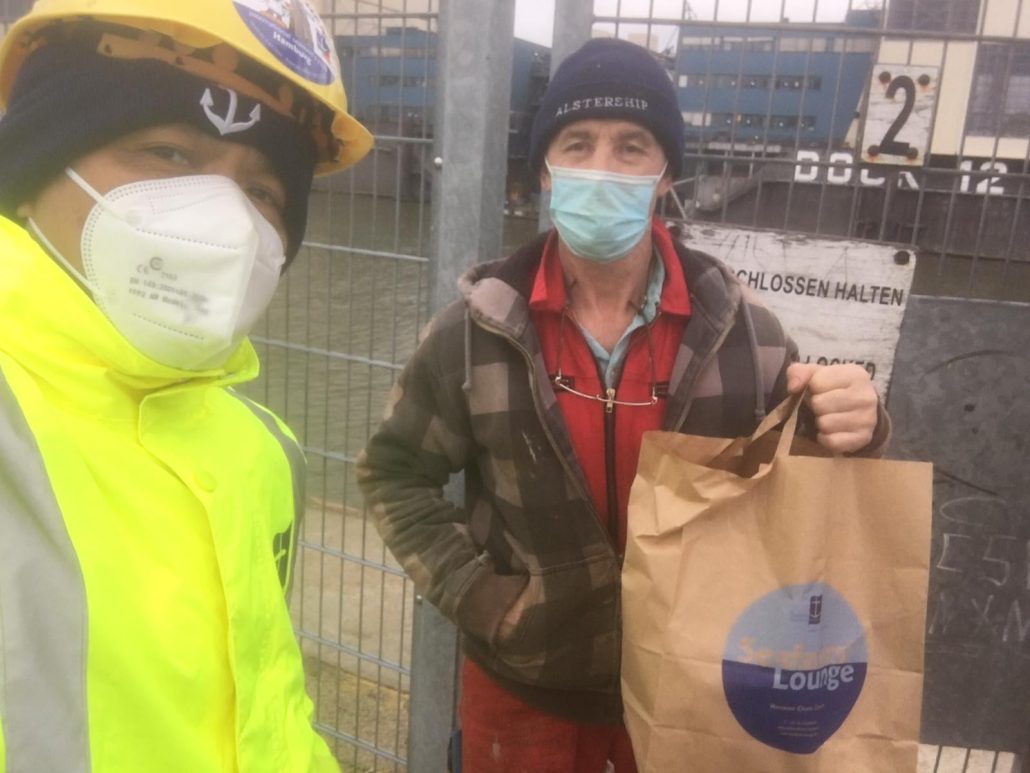
The bishop’s hopes for his return to the Philippines before long was dashed when former President Rodrigo Duterte signed into law the anti-terrorism bill in July 2020, however. He was convinced to apply for asylum and was granted an interview by the German government in December 2021. It was granted in just 16 days.
This month, Bishop Ablon returned to the United Nations in Geneva to attend the UNHRC’s fourth periodic review on the human rights situation in the Philippines. He spoke at the rally in front of the UN after the review and in a forum at the World Council of Churches headquarters in Geneva. In the Swiss capital of Bern last November 12, he attended as special guest the city’s Night of the Religions. The next day, he delivered a sermon at the St. Peter and Paul Cathedral in a Mass celebrated by OCC Bern Bishop Harald Rein. In his homily, Bishop Ablon asked for solidarity by the churches and peoples of the world for the Filipino people’s quest for human rights and justice.
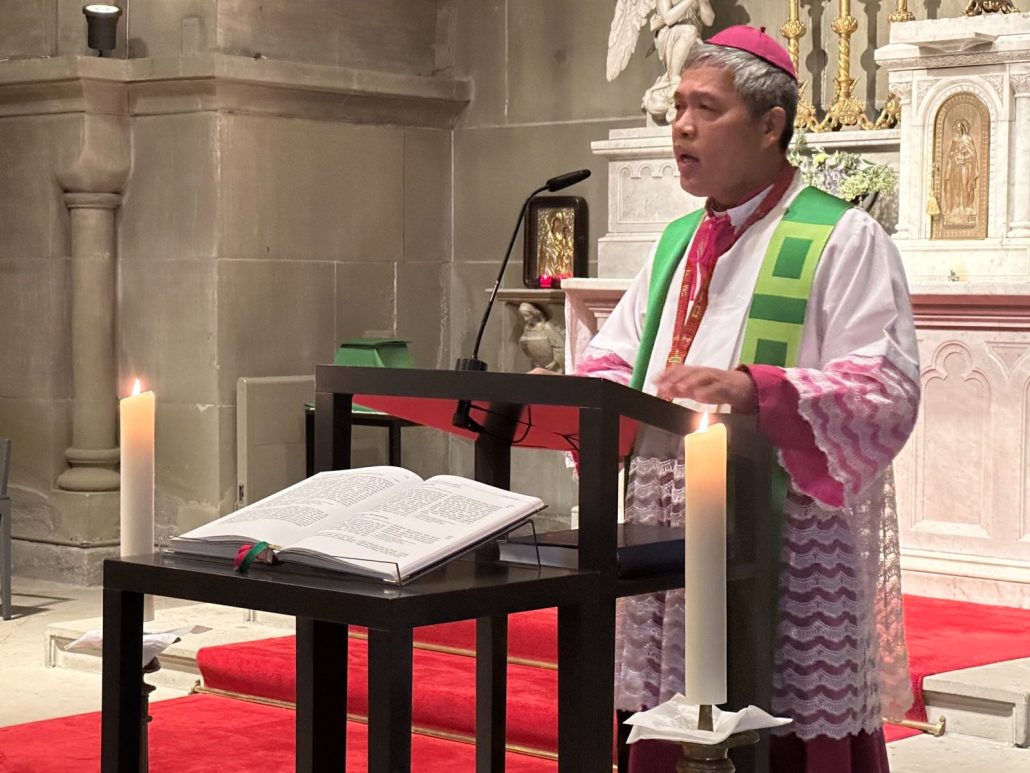
“Tell the world”
Bishop Ablon has become a celebrity of sorts in Europe. He is welcomed by fellow bishops, priests and church members in many churches and across religions. He elicits greater admiration when they realize that he brings his bishop’s vestments in a simple and small backpack that he received as a loyal public transport passenger.

His own pectoral cross, an intricate beadwork made especially for him by the Lumad, was cited as one of the most unique among hundreds at the Lambeth Conference.
But the church leader has more crosses to bear than being a church and diocese-less bishop in foreign land. He has not seen his wife and younger son for three years and makes do with just video calls. “In fact, when President Ferdinand Marcos Jr. became president, I thought of not seeing my family anytime soon,” he said.
“In my sermons and speeches, however, I always remember what the community leader of Barangay Saad begged of me,” Bishop Ablon said. He said it is what gives him strength. “In my last visit to Barangay Saad, the elder held my hand and begged me: ‘Tell the whole world of what we suffer and our dreams of a better life. We hope the persecution of us Lumads would stop,’” the bishop recalls.
“This is now my mission for my church and my people,” Ablon said. #

